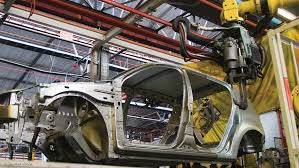South Africa’s automotive sector, a vital part of the country’s manufacturing landscape, faces a possible shutdown as wage negotiations reach a critical point. The National Union of Metalworkers of South Africa (NUMSA), representing over 100,000 workers, is demanding a 10% pay increase from major employers such as BMW South Africa, Toyota, and Ford. These talks will determine wages for the next three years but have raised concerns about the industry’s future amid numerous challenges.
NUMSA’s wage demand is more than triple the current inflation rate, yet it marks the lowest initial offer in at least four negotiation rounds. The union argues the increase is necessary as workers grapple with rising living costs and economic hardship. Phakamile Hlubi-Majola, NUMSA’s spokesperson, stated that asking for inflation-linked pay rises alone is “unrealistic” given the struggles faced by members. Meanwhile, employer groups have remained silent, as formal negotiations have not yet begun.
The automotive sector is a backbone of South Africa’s economy, contributing about 5% of the country’s gross domestic product (GDP) and accounting for more than 20% of manufacturing output. However, this sector faces significant headwinds that threaten its sustainability:
Global economic uncertainty fueled by fears of an expanded conflict in the Middle East and increased US tariffs on automotive imports.
South Africa’s potential exclusion from a key trade agreement that grants African nations preferential access to the US market.
The global shift toward electric vehicles (EVs), affecting demand for traditional vehicles exported from South Africa.
An influx of low-cost imported vehicles flooding the local market.
Economic experts warn these factors could worsen the already fragile state of manufacturing in South Africa. Siyabonga Mthembu, a partner at auditing firm BDO South Africa, stressed that the proposed 10% wage hike, combined with existing industry challenges, could negatively impact business performance. “International automotive companies operating here must explore survival strategies, including market diversification,” Mthembu said.
South Africa remains the world’s most unequal country, with sluggish economic growth over the past decade. The automotive industry, while a key contributor, has been severely impacted by electricity shortages and logistical issues. A strike triggered by deadlocked wage talks could further paralyze production and deepen the economic strain.
Consumer behavior in the vehicle market has shifted notably. According to Paulina Mamogobo, chief economist at the National Association of Automobile Manufacturers of South Africa (NAAMSA), nearly 62% of light vehicles sold last year were priced under 500,000 rand (about $27,588), reflecting growing preference for affordable imports. NAAMSA also reports that exports, which make up two-thirds of South Africa’s vehicle production, have suffered. Despite US tariffs on imports coming into force in April, exports to North America declined by over 70% year-on-year in the first quarter.
To address these challenges, key industry players have urged the South African government to expedite a review of the production incentive program and the broader industry master plan, originally set for later years. Mamogobo indicated that NAAMSA is collaborating with its members to develop evidence-based solutions to boost competitiveness.
Economists like Lesego Moshikaro-Amani from Trade & Industrial Policy Strategies recommend that South Africa invest in local battery production for EVs, mineral processing, and refining to support the automotive industry. Additionally, attracting new manufacturers aggressively and focusing on affordable vehicle production, including two- and three-wheelers for export across Africa, could open new growth avenues.
With the looming risk of strike action and ongoing economic pressures, South Africa’s automotive sector stands at a crossroads. How the government, industry leaders, and unions navigate these challenges will shape the future of a sector crucial to the nation’s manufacturing strength and overall economic health.
